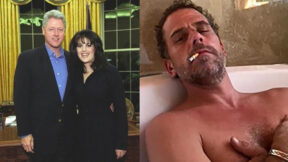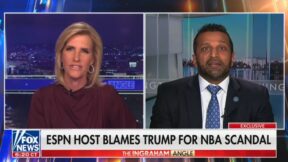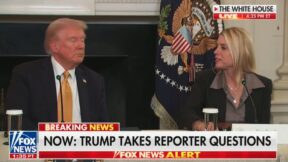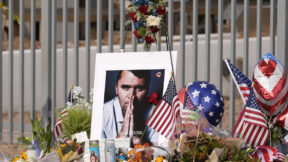‘What’s He Doing About It Today?’ White House Reporters Demand To Know Biden’s ‘Engagement’ on Gun Violence
Multiple reporters grilled White House Press Secretary Karine Jean-Pierre over President Joe Biden’s “engagement” on the issue of gun violence, with one of them asking “What’s he doing about it today?”
Gun violence has been thrust back into a spotlight that never seems to dim on the heels of the mass shooting that killed eight people at a mall in Allen, Texas, Saturday. Despite polls that consistently show overwhelming public support for gun regulation, Republicans have continued to block and resist almost all such measures.
But at Monday’s press briefing, four different White House reporters focused their attention on Biden — who has consistently and publicly pressed Congress to enact gun control legislation including an assault weapons ban and signed a dozen executive orders on guns.
CBS News Radio correspondent Steve Portnoy was first — keying in on Jean-Pierre’s opening remarks calling gun violence a “crisis” and asking what the president is “doing about it today” — after which CNN’s Jeremy Diamond followed up by asking what President Biden is doing other than demanding Congress take action, and why he isn’t doing that “more forcefully.”
Jean-Pierre gave both reporters lengthy responses about the president’s engagement on the issue:
STEVE PORTNOY: you referred to this — when it comes to guns, you said this is a “crisis.” You talk about it being 201st first mass shootings this year. The President’s position is known, but can you describe his engagement on this crisis today? What’s he doing about it today? Because many Americans, they’re certainly happy to hear that he’s engaged on airline prices and airline compensation, but what about this issue that many Americans agree with you is a crisis?
MS. JEAN-PIERRE: Well, many Americans should know and understand — and hopefully — and I’ll repeat it here — that the President has signed more than a dozen executive actions to deal with this issue, more than any other President, in a historical fashion, because he has said that gun violence is an epidemic. He has said that; he has called it that.
This is a President that has worked on this issue as a senator, as Vice President, and as President. He has done everything that he can, using the tools that are in front of him, to deal with this issue.
Now, will there be more work to do and more things that he can do? We’ll see. We’re always looking for how do we move this along to a way — to a place where our schools are safer, our communities are safer. This is so incredibly important.
We — you know, I mentioned, you know, 14- — more than 14,000 of our fel- — fellow citizens have lost their lives. One is too much. One person losing their life is too much.
And so, look, the President has done the work. He’s asking Congress to do their job. Let’s do some legislation — more legislation — on top of the bipartisan legislation that he was able to sign this summer. So let’s do more. Let’s really do something that we can make sure that this is long — no longer an epidemic in our — in our communities and in our schools.
Go ahead.
JEREMY DIAMOND: Thanks, Karine. After the Louisville shooting in April, the President, as he did yesterday, called on Congress to ban assault weapons. He made clear, as you just did now, that this is a crisis, and he pointed to the previous executive actions that you just talked about. But we didn’t really see anything else from the President. So if this is a crisis, why aren’t we seeing the President talk about this more forcefully? Why isn’t he out around in the country rallying people, putting pressure on members of Congress? When are we going to see that kind of engagement?
MS. JEAN-PIERRE: More than two dozen executive actions that he’s taken, more than any other President — more than any Pre- — other President. He’s been in the administration, as President, for a little bit more than two years. Two dozen actions that he’s taken.
He’s had to visit — we’re about to, sadly, have the anniversary of the Buffalo shooting, and then Uvalde. Two places that the President went to comfort the families who were — who lost their children and who lost their loved ones. And from there, he continued to do the work.
He signed — we signed — he signed, as I mentioned to Steve, as you all know and covered, a bipartisan — bipartisan piece of legislation, the Safer Communities Act. So this is a President that has taken action.
And the sad part — and I get the questions that are coming to me, as they should be; I am the spokesperson for the President. But where’s Congress’s responsibility on this? Where’s their responsibility on this? We need legislation.
It is frustrating — and I am sure you all are frustrated too — to talk about this over and over again, one — averaging out to once — one mass shooting a week. That’s not okay.JEREMY DIAMOND: But I guess the question is: Other than saying in these statements after every mass shooting, “Congress needs to do this,” what is the President doing to actually get Congress to act? Because we don’t see, from a public-facing perspective, much other than these statements as of late. And the President himself has said that he believes he’s reached the extent of his executive authorities.
MS. JEAN-PIERRE: Right. That’s right. Congress needs to act.
He’s using his bully pulpit. He’s being very, very clear — talked about it during the State of the Union, talked about it many times before — about the horrors of gun violence in our community, in our schools, in our temples, in our places of worship. As we continue to see, this is a President who has been incredibly vocal — and not just him; the Vice President, the First Lady.
I mean, Jeremy, I appreciate the question, but Congress has to act. There has to be legislation coming from the other side of Pennsylvania Avenue. There has to be. Two dozen pieces of executive action in two years that this President has done. Historic. That is historic.
So, you know, look, I want the American people to know that this is an epidemic that — as they know themselves, some of them having suffered potentially gun violence in their community or in their families. This is a President that cares about making sure that their communities are safe and they feel safe with their kids going to school.
So we’re going to continue to use the bully pulpit. He’s going to do that to call out Congress. And they have to act.
Two more reporters — ABC News White House correspondent Karen Travers and AFP’s Aurélia End — similarly followed up, with End even suggesting that “there isn’t anything more the President can do, and anything he would do would harm his campaign”:
KAREN TRAVERS: Just to follow up on some of the questions Jeremy was asking. You know, the President did deliver remarks today. He did not mention the shooting in Texas.
You know, you talk about using the bully pulpit. But is he fully using the bully pulpit? Is he fully using the weight of the office to push for these actions that he keeps saying he wants Congress to move forward on?
MS. JEAN-PIERRE: Yes. I think two dozen executive actions speaking on it over and over again. He’s been very clear about the epidemic that we see in gun violence across the country. He has been clear not just as President, as Vice President, as senator. And he’ll continue to do that, not just him — the Vice President, the First Lady, as well.
We have used the full weight of the administration to do all that we can, use the tools that we have to deal with this issue.
But the fact remains, Karen, is that we need legislation. We need federal legislation to deal with this issue. We have seen some state legislation, as you know, banning assault — assault weapons, which is incredibly important. And I’ve lifted those up from here. So there are states out there who are doing the job, doing the work to keep their communities, their constituency safe. But we need federal legislation.
That — it is — it is truly a non-starter. We need them, on the other side of, again, Pennsylvania, to do their job.
KAREN TRAVERS: You mentioned Buffalo, you mentioned Uvalde; the President traveled there. You said it’s frustrating to talk about this over and over again.
Is it frustrating for the President? And is that part of the calculation that you’re not talk- — having him talk about every shooting, because of the frequency that these are happening?
How do you make the decision of where he goes and which events he talks about, because of how much they’re happening right now?
MS. JEAN-PIERRE: So in case I’m not clear: It is frustrating for the President, it is frustrating for the First Lady, it is frustrating for the Vice President, it is frustrating for the Second Gentleman that there is this gun violence epidemic going on, which is why the President has signed two dozen executive actions to try to do everything that he can from his perch, from — from the — from the executive — executive perch, to do everything that he can.
And so, again, we’re going to call on Congress to act. They have to. They have to.
I just — I just said 14,000 Americans — 14,000 Americans have dealt with this type of violence — gun violence across the country.
This is the only country in the world that has this going on right now. The only country that has to deal with gun violence, mass shootings in this way. That shouldn’t be.
—
AURÉLIA END: You just said this gun violence epidemic isn’t happening anywhere else in the world.
MS. JEAN-PIERRE: The mass shootings that we’re seeing.
AURÉLIA END: Yeah, the mass shootings. I mean, in a country like Serbia, they had two mass shootings in 48 hours. Immediately, the government announced sweeping new legislation to disarm the country. This is the most powerful country in the world. And what we have, as you said, is executive orders, but mostly, like, statements and flags flying at half-mast.
Is it a sense that it’s not only frustration, but that there isn’t anything more the President can do, and anything he would do would harm his campaign?
MS. JEAN-PIERRE: What’s your last part of the question?
AURÉLIA END: I mean, is this the sense that he’s not speaking more about it because he feels there’s nothing that can be done because Congress is not in a position to do anything and that it wouldn’t help if he went, you know, more out and spoke more about this and engaged more about this?
MS. JEAN-PIERRE: Look, the President is asking for Congress to act because we need legislation. We need federal legislation to deal with this issue.
And to your point, the President has taken action as President in taking executive action — more than two dozen — because he’s taken this very seriously — more than any other President. Historic amount of actions. I think that should tell you how seriously this President takes it. I think that should show you how he has made this a priority.
I think this also should show you that he sees this as an epidemic — gun violence that’s happening across the country, in our communities, in our schools. And he wants and he’s going to continue to call for Congress to put forth real legislation banning assault weapons, because we should not have weapons of war on the street; making it — you know, making it tougher to make sure that it doesn’t get — guns doesn’t get into the wrong hands. And so that’s what the President is going to continue to call for.
Obviously — obviously, he takes this seriously. But he is — he has said himself — I think Jeremy was saying this to me — he’s limited in what he can do. He is. That’s why Congress needs to take federal — federal legislation. They need to take action on this, and so we’re going to continue to call for it.
Watch above via The White House.




